
THERIOGENOLOGY
Scope & Guideline
Advancing veterinary reproduction through groundbreaking research.
Introduction
Aims and Scopes
- Animal Reproductive Physiology:
Research on the physiological mechanisms regulating reproduction in various species, including hormonal regulation, gametogenesis, and reproductive cycles. - Assisted Reproductive Technologies (ARTs):
Studies on techniques such as in vitro fertilization (IVF), intracytoplasmic sperm injection (ICSI), and embryo transfer, focusing on their application and optimization in livestock and companion animals. - Embryo Development and Quality:
Investigation into factors affecting embryo development, viability, and quality, including culture conditions, cryopreservation techniques, and maternal influences. - Reproductive Health and Diseases:
Research on reproductive disorders, their diagnosis, management, and the impact of diseases on fertility and reproductive outcomes. - Genetics and Reproductive Biotechnology:
Studies involving genetic manipulation, including CRISPR/Cas9 applications, and the genetic basis of reproductive traits in various species. - Nutritional and Environmental Influences:
Exploration of how nutrition and environmental factors, such as heat stress, affect reproductive performance and outcomes in livestock.
Trending and Emerging
- Utilization of CRISPR and Genetic Engineering:
An increase in studies employing CRISPR technology for gene editing in livestock indicates a growing interest in the genetic improvement of reproductive traits and disease resistance. - Impact of Environmental Stressors:
Research focusing on the effects of environmental factors, particularly heat stress and nutrition, on reproductive performance is gaining traction, highlighting the need for adaptive strategies in livestock management. - Microbiome Research in Reproduction:
Emerging studies exploring the role of the microbiome in reproductive health, particularly in relation to fertility and pregnancy outcomes, are becoming more prevalent. - Infertility and Reproductive Disorders Management:
A trend towards more comprehensive studies addressing infertility issues and reproductive disorders, including the application of novel therapeutic approaches, is evident. - Integration of Machine Learning and AI:
The application of machine learning and artificial intelligence in predicting reproductive outcomes and analyzing large datasets is on the rise, indicating a technological shift in reproductive research.
Declining or Waning
- Traditional Breeding Methods:
Research focusing solely on conventional breeding techniques is becoming less common as the field shifts towards more advanced reproductive technologies and genetic approaches. - Non-Scientific Anecdotal Evidence:
Papers that rely heavily on anecdotal or non-empirical evidence regarding reproductive practices are decreasing, with a stronger emphasis now on data-driven research. - Basic Descriptive Studies:
There is a noticeable decline in basic descriptive studies of reproductive anatomy and physiology, as the field moves towards more application-oriented research that integrates technology and biotechnology.
Similar Journals

Jornal Brasileiro de Reproducao Assistida
Advancing reproductive science for a healthier tomorrow.Jornal Brasileiro de Reprodução Assistida is a prominent academic journal focusing on the latest advancements in reproductive medicine, published by the Sociedade Brasileira de Reprodução Assistida (SBRA). With an ISSN of 1517-5693 and an E-ISSN of 1518-0557, this journal has established itself as a vital resource for researchers, healthcare professionals, and students in the fields of obstetrics and gynecology. Notably recognized within the Q2 category for Obstetrics and Gynecology, it ranks #91 out of 209 in Scopus, placing it in the 56th percentile among its peers. The journal serves as a platform for disseminating innovative research and clinical practices related to assisted reproduction, fostering collaboration and knowledge sharing among professionals in Brazil and beyond. Although currently not an open-access journal, it remains committed to enhancing the scientific discourse in reproductive health, reflecting its vision of supporting advances in healthcare through rigorous peer-reviewed studies. Explore the pivotal contributions made in this field from 2000 to the present, and stay abreast of transformative developments that are shaping reproductive science.

Reproduction and Fertility
Advancing insights in reproductive health.Reproduction and Fertility is a premier academic journal published by BIOSCIENTIFICA LTD, dedicated to advancing knowledge in the fields of reproductive sciences, obstetrics, gynecology, and related areas. Established with a focus on delivering high-quality research, this journal has quickly ascended in prominence, achieving a commendable Q2 ranking in multiple categories, including Embryology, Obstetrics and Gynecology, Reproductive Medicine, and Urology, as of 2023. With an E-ISSN of 2633-8386, Reproduction and Fertility aims to provide a valuable platform for researchers, professionals, and students alike, offering insights into the latest discoveries and innovations in reproductive health. Although currently not an open-access journal, it remains committed to disseminating important findings that can influence clinical practices and policy-making worldwide. Operating from its headquarters in Bristol, United Kingdom, the journal serves as an essential resource for anyone invested in understanding and improving reproductive health outcomes through rigorous academic research.
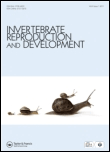
INVERTEBRATE REPRODUCTION & DEVELOPMENT
Innovating Insights into Animal Science and Zoology.INVERTEBRATE REPRODUCTION & DEVELOPMENT, published by Taylor & Francis Ltd, is a pivotal journal in the fields of Animal Science and Zoology, with a significant focus on the reproductive and developmental processes of invertebrates. Established in 1989 and running through 2024, this journal has become an essential resource for researchers, professionals, and students interested in the intricacies of invertebrate biology. With an impressive Q2 ranking in Animal Science and Zoology and a dedicated readership, the journal explores a variety of topics including reproductive mechanisms, developmental stages, and phylogenetic aspects of invertebrates. While currently not open access, the journal provides robust scholarly content that contributes to advancing knowledge in both basic and applied biological sciences. The Scopus rankings further underscore its relevance, particularly in the domains of developmental biology and genetics, making it a noteworthy publication for those engaged in this dynamic field of research.
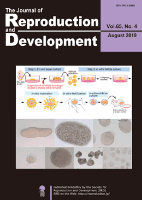
JOURNAL OF REPRODUCTION AND DEVELOPMENT
Integrating knowledge for a sustainable future.JOURNAL OF REPRODUCTION AND DEVELOPMENT, published by the SOCIETY REPRODUCTION & DEVELOPMENT-SRD in Japan, is a leading peer-reviewed journal dedicated to advancing the field of reproduction and development in animal sciences. With a notable impact factor reflected in its prestigious Q1 Quartile ranking in Animal Science and Zoology, the journal aims to disseminate cutting-edge research that explores the complexities of reproductive biology, developmental processes, and their implications for agriculture and biodiversity. This journal invites contributions that span multidisciplinary interests, thereby facilitating the integration of scientific knowledge and practical applications. Researchers, professionals, and students can benefit from the insights shared within its pages, as it strives to foster collaboration and innovation in the field. The journal’s comprehensive scope and esteemed reputation, underscored by its Scopus rank of #115 out of 490 in the category, make it an invaluable resource for anyone invested in the study of reproduction and development.
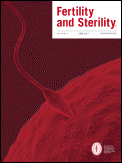
FERTILITY AND STERILITY
Advancing knowledge in reproductive health.Fertility and Sterility is a prestigious peer-reviewed journal dedicated to the fields of obstetrics, gynecology, and reproductive medicine. Published by Elsevier Science Inc, this journal has been a cornerstone of scientific discourse since its inception in 1950 and is set to continue its influential coverage of cutting-edge research until 2024. Boasting an impressive impact factor, Fertility and Sterility is ranked among the top-tier journals in its category, holding Q1 status in both Obstetrics and Gynecology and Reproductive Medicine. With Scopus rankings placing it in the 97th and 96th percentiles respectively, the publication serves as a vital resource for researchers, clinicians, and students who seek to advance their understanding of fertility issues and reproductive health. Although it does not currently offer open access options, the journal remains committed to disseminating high-quality research and innovative solutions to the complex challenges in reproduction, empowering professionals and scholars to make meaningful contributions in their fields.
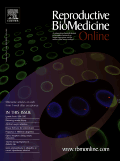
REPRODUCTIVE BIOMEDICINE ONLINE
Advancing reproductive science through rigorous research.Reproductive Biomedicine Online, published by Elsevier, is a leading peer-reviewed journal that has established itself as a pivotal resource in the fields of Developmental Biology, Obstetrics and Gynecology, and Reproductive Medicine. With an impressive Impact Factor and a Q1 ranking in its respective disciplines as of 2023, this journal provides a platform for innovative research and comprehensive reviews that contribute to advancements in reproductive healthcare. The journal boasts rigorous Scopus rankings, placing it within the top tiers of its categories, which underscores its significance in shaping contemporary biomedical inquiry. Although not open access, it remains widely accessible through institutional subscriptions, making its wealth of knowledge available to researchers, clinicians, and students alike. Since its inception in 2000, Reproductive Biomedicine Online has been committed to fostering a deeper understanding of reproductive processes and biomedicine, ensuring that its content remains relevant and impactful in addressing challenges in reproductive health, thereby championing exceptional scientific discourse.

International Journal of Fertility & Sterility
Empowering Insights in Obstetrics and GynecologyThe International Journal of Fertility & Sterility, published by ROYAN Institute, is a leading academic platform dedicated to advancing knowledge in the fields of obstetrics, gynecology, and reproductive medicine. With an ISSN of 2008-076X and an E-ISSN of 2008-0778, this Open Access journal has been making significant contributions to the scientific community since its inception in 2007. Based in Tehran, Iran, the journal showcases rigorous research and promotes interdisciplinary collaboration, addressing critical topics related to fertility, sterility, and reproductive health. As of 2023, it holds an impressive Q2 ranking in Obstetrics and Gynecology and a Q3 ranking in Reproductive Medicine, underscoring its relevance and impact in the academic sphere, with Scopus ranks placing it at #67 in Obstetrics and Gynecology and #32 in Reproductive Medicine. The journal's commitment to accessibility and quality is reflected in its global readership, making it an essential resource for researchers, healthcare professionals, and students seeking to enhance their understanding of fertility issues and reproductive technologies.

Reproductive Biology
Exploring the Mechanisms of Life's ContinuityReproductive Biology is a premier academic journal published by Elsevier, dedicated to advancing the field of reproductive science. With an ISSN of 1642-431X and an E-ISSN of 2300-732X, this journal has been serving the scientific community since its inception in 2001. It notably holds a Q1 ranking in Animal Science and Zoology as of 2023, underscoring its significant impact and prominence in this domain. The journal encompasses a wide array of topics surrounding reproductive biology, including but not limited to endocrinology and developmental processes, making it an essential resource for researchers and practitioners. Although it operates under a traditional access model, its comprehensive scope offers valuable insights that contribute to advancements in reproductive health, animal conservation, and biotechnology. Published in the Netherlands, Reproductive Biology aims to foster interdisciplinary collaboration and innovation, ultimately enriching our understanding of reproductive mechanisms across various species. Researchers, professionals, and students alike will find this journal an indispensable platform for disseminating groundbreaking research and engaging with the latest findings in reproductive science.
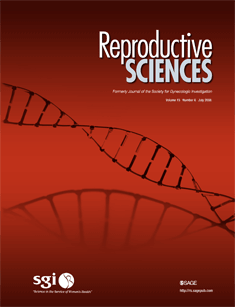
Reproductive Sciences
Elevating Standards in Reproductive Health ResearchReproductive Sciences is a premier journal published by SPRINGER HEIDELBERG, dedicated to the field of obstetrics and gynecology. With its ISSN 1933-7191 and E-ISSN 1933-7205, the journal has established itself as a leading source of high-quality research and clinical insights since its inception in 2007, and continues to converge its scope into 2024. Currently ranked in the Q1 category for obstetrics and gynecology, it holds the 43rd position among 209 journals in the Scopus rankings, underscoring its influence and relevance within the medical community. This journal is particularly dedicated to advancing knowledge in reproductive health, providing a platform for innovative research and clinical practices through both traditional and open access options. Located in Switzerland with an address in Heidelberg, Germany, Reproductive Sciences is not just a publication; it is a vital resource for researchers, professionals, and students seeking to make impactful contributions to the field of reproductive health.

Reproductive Biology and Endocrinology
Driving Discoveries in Endocrine Mechanisms and Reproductive HealthReproductive Biology and Endocrinology, published by BMC, is a distinguished open-access journal established in 2003, catering to researchers and professionals in the interdisciplinary fields of reproductive biology, endocrinology, and related biomedical sciences. With a notable impact in 2023, the journal has achieved Q1 rankings in Obstetrics and Gynecology, Reproductive Medicine, and Endocrinology, alongside a Q2 ranking in Developmental Biology, establishing itself as a pivotal source of high-quality research and insights. The journal's commitment to freely accessible research promotes knowledge dissemination across its domains, which is crucial for advancing understanding of reproductive health and endocrine mechanisms. With a robust Scopus ranking showcasing its relevance—17th out of 209 in Obstetrics and Gynecology, and 8th out of 90 in Reproductive Medicine—it serves as an essential resource for academics and clinicians alike, facilitating innovative research and fostering collaboration within the global scientific community.